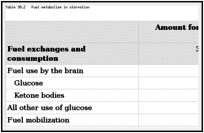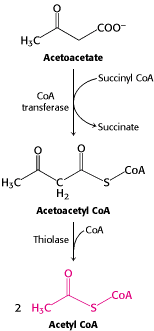I kept seeing KCKO on this site but could not figure it out. It was only today that I heard on the podcast it used as a phrase. For those like me it’s Keep Calm Keto On.
What did you learn today?
Just linking this here because people SHOULD learn it if they don’t know this.
I’m reading the obesity code today. I think I knew most of this from podcasts a d videos but Jason Fung does a great job dispelling myth after myth with science.
Halfway through. Must finish it this week.
Easily my most-impactful book of 2018.
Probably this millennium, actually.
I really enjoyed obesity code too. On MFP if Jason Fung’s name was mentioned people would start up with he is a quack and other doctors laugh at him. I suggested that they can criticize his work but if he is a MD he should get some respect. They then would jump on me asking why am I defending him. They were almost afraid of him. Knowing their mentality I decided I should read some of his books and was glad I did.
Not from today, but I learned how deep the tendency to victim-blame goes with the Keto groups of FB. After somebody asked a racist question about why Asians (all Asians, of course) are skinny when they eat rice, people trudged out the usual “they eat less” and “work harder” than us fat and lazy Americans (they ignored Asian Americans, of course). Apparently they’re so isolationist they don’t know that not only are there more overweight Chinese citizens than Americans, but they have one of the worst T2D epidemics of any country, second to most Native American communities. People don’t know what “skinny fat” means and why it’s possibly more dangerous than carrying your fat more visibly.
They don’t like to question the role sugar had in China in just the last forty years. It just makes more sense to say “Asians eat less” and believe that millions of Americans collectively lost their willpower seventy years ago.
https://www.ncbi.nlm.nih.gov/books/NBK22414/#A4359
30.3.1. Metabolic Adaptations in Prolonged Starvation Minimize Protein Degradation
![]() What are the adaptations if fasting is prolonged to the point of starvation? A typical well-nourished 70-kg man has fuel reserves totaling about 161,000 kcal (670,000 kJ; see Table 30.1). The energy need for a 24-hour period ranges from about 1600 kcal (6700 kJ) to 6000 kcal (25,000 kJ), depending on the extent of activity. Thus, stored fuels suffice to meet caloric needs in starvation for 1 to 3 months. However, the carbohydrate reserves are exhausted in only a day.
What are the adaptations if fasting is prolonged to the point of starvation? A typical well-nourished 70-kg man has fuel reserves totaling about 161,000 kcal (670,000 kJ; see Table 30.1). The energy need for a 24-hour period ranges from about 1600 kcal (6700 kJ) to 6000 kcal (25,000 kJ), depending on the extent of activity. Thus, stored fuels suffice to meet caloric needs in starvation for 1 to 3 months. However, the carbohydrate reserves are exhausted in only a day.
Even under starvation conditions, the blood-glucose level must be maintained above 2.2 mM (40 mg/dl). The first priority of metabolism in starvation is to provide sufficient glucose to the brain and other tissues (such as red blood cells) that are absolutely dependent on this fuel . However, precursors of glucose are not abundant. Most energy is stored in the fatty acyl moieties of triacylglycerols. Recall that fatty acids cannot be converted into glucose, because acetyl CoA cannot be transformed into pyruvate (Section 22.3.7). The glycerol moiety of triacylglycerol can be converted into glucose, but only a limited amount is available. The only other potential source of glucose is amino acids derived from the breakdown of proteins. However, proteins are not stored, and so any breakdown will necessitate a loss of function. Thus, the second priority of metabolism in starvation is to preserve protein, which is accomplished by shifting the fuel being used from glucose to fatty acids and ketone bodies (Figure 30.16).
Figure 30.16
Fuel Choice During Starvation. The plasma levels of fatty acids and ketone bodies increase in starvation, whereas that of glucose decreases.
The metabolic changes on the first day of starvation are like those after an overnight fast. The low blood-sugar level leads to decreased secretion of insulin and increased secretion of glucagon. The dominant metabolic processes are the mobilization of triacylglycerols in adipose tissue and gluconeogenesis by the liver. The liver obtains energy for its own needs by oxidizing fatty acids released from adipose tissue . The concentrations of acetyl CoA and citrate consequently increase, which switches off glycolysis. The uptake of glucose by muscle is markedly diminished because of the low insulin level, whereas fatty acids enter freely. Consequently, muscle shifts almost entirely from glucose to fatty acids for fuel . The β-oxidation of fatty acids by muscle halts the conversion of pyruvate into acetyl CoA, because acetyl CoA stimulates the phosphorylation of the pyruvate dehydrogenase complex, which renders it inactive (Section 17.2.1). Hence, pyruvate, lactate, and alanine are exported to the liver for conversion into glucose. Glycerol derived from the cleavage of triacylglycerols is another raw material for the synthesis of glucose by the liver.
Proteolysis also provides carbon skeletons for gluconeogenesis. During starvation, degraded proteins are not replenished and serve as carbon sources for glucose synthesis. Initial sources of protein are those that turn over rapidly, such as proteins of the intestinal epithelium and the secretions of the pancreas. Proteolysis of muscle protein provides some of three-carbon precursors of glucose. However, survival for most animals depends on being able to move rapidly, which requires a large muscle mass, and so muscle loss must be minimized.
How is the loss of muscle curtailed? After about 3 days of starvation, the liver forms large amounts of acetoacetate and d-3-hydroxybutyrate (ketone bodies; Figure 30.17). Their synthesis from acetyl CoA increases markedly because the citric acid cycle is unable to oxidize all the acetyl units generated by the degradation of fatty acids. Gluconeogenesis depletes the supply of oxaloacetate, which is essential for the entry of acetyl CoA into the citric acid cycle. Consequently, the liver produces large quantities of ketone bodies, which are released into the blood. At this time, the brain begins to consume appreciable amounts of acetoacetate in place of glucose . After 3 days of starvation, about a third of the energy needs of the brain are met by ketone bodies (Table 30.2). The heart also uses ketone bodies as fuel.
Figure 30.17
Synthesis of Ketone Bodies by the Liver.
Table 30.2
Fuel metabolism in starvation.
After several weeks of starvation, ketone bodies become the major fuel of the brain . Acetoacetate is activated by the transfer of CoA from succinyl CoA to give acetoacetyl CoA (Figure 30.18). Cleavage by thiolase then yields two molecules of acetyl CoA, which enter the citric acid cycle. In essence, ketone bodies are equivalents of fatty acids that can pass through the blood-brain barrier . Only 40 g of glucose is then needed per day for the brain, compared with about 120 g in the first day of starvation. The effective conversion of fatty acids into ketone bodies by the liver and their use by the brain markedly diminishes the need for glucose. Hence, less muscle is degraded than in the first days of starvation . The breakdown of 20 g of muscle daily compared with 75 g early in starvation is most important for survival. A person’s survival time is mainly determined by the size of the triacylglycerol depot.
Figure 30.18
Entry of Ketone Bodies Into the Citric Acid Cycle.
What happens after depletion of the triacylglycerol stores? The only source of fuel that remains is proteins. Protein degradation accelerates, and death inevitably results from a loss of heart, liver, or kidney function.
You’re on the ball there. We were taught very little but are expected to educate others 
Ive learned several things
1)Poop is important and necessary for the body.
No pooping = no bueno!
2)Fasting will ckean your body right out if done
long enough
3)Refeeding after fasting = pooping
ALSO… if you take protein shakes… take Meg Citrate too! That stuff will block ya right up!
#embarresingstories
Learning about cancer.
Cancer as a metabolic disease: implications for novel therapeutics
[Thomas N. Seyfried](javascript: [Roberto E. Flores](javascript:
[Roberto E. Flores](javascript: [Angela M. Poff](javascript:
[Angela M. Poff](javascript: [Dominic P. D’Agostino](javascript:
[Dominic P. D’Agostino](javascript:
Carcinogenesis , Volume 35, Issue 3, 1 March 2014, Pages 515–527,https://doi.org/10.1093/carcin/bgt480
https://academic.oup.com/carcin/article/35/3/515/2463440
Emerging evidence indicates that cancer is primarily a metabolic disease involving disturbances in energy production through respiration and fermentation. The genomic instability observed in tumor cells and all other recognized hallmarks of cancer are considered downstream epiphenomena of the initial disturbance of cellular energy metabolism. The disturbances in tumor cell energy metabolism can be linked to abnormalities in the structure and function of the mitochondria. When viewed as a mitochondrial metabolic disease, the evolutionary theory of Lamarck can better explain cancer progression than can the evolutionary theory of Darwin. Cancer growth and progression can be managed following a whole body transition from fermentable metabolites, primarily glucose and glutamine, to respiratory metabolites, primarily ketone bodies. As each individual is a unique metabolic entity, personalization of metabolic therapy as a broad-based cancer treatment strategy will require fine-tuning to match the therapy to an individual’s unique physiology.
Actually the more I read the angrier I get. I knew that there was resistance but darn not this much. And then I read on other posts here about how people are stupid on FB and other forums about science. It comes down to show me the science. I need to get to the end of the obesity code so I can implement, itterate, improve and move on.
My boyfriend is learning Kanji (Japanese writing) from a phone app. He showed me his lessons today.
I learned that the principles of Japanese writing (how characters are combined) have much in common with what I’ve learned about the linguistics of spoken languages (how morphemes are arranged). That’s exciting to me!
TODAY
Sitting across from two lovely ladies at Starbucks - eavesdropping 
I heard “ im taking more magnesium along w more Vitamin D”
Me-That sparked my interest🤔
Then I heard “ I’m still paying more attention to carbs “
Me-
I just looked up and said “ carbs, I’m watching as well “
Then it turned in to a lengthy conversation about Keto!
THey are both on Keto for 2 years😁
I ended up referring to this site. I even had them take a screenshot of my phone on this site
Technology tip. Lol
“ What did I learn today ?”
NOTHING!!
jk
Being the introvert and to myself person a lot
for something that I am passionate about and care for others…awe how cute😊
Even I CAN AND WILL come out of my “ hermit crab shell “
Go figure🙂
YES. Good one
I’ll paint your shell if you paint mine?
Lol
Cheesy pun. I’ll stop sorry







